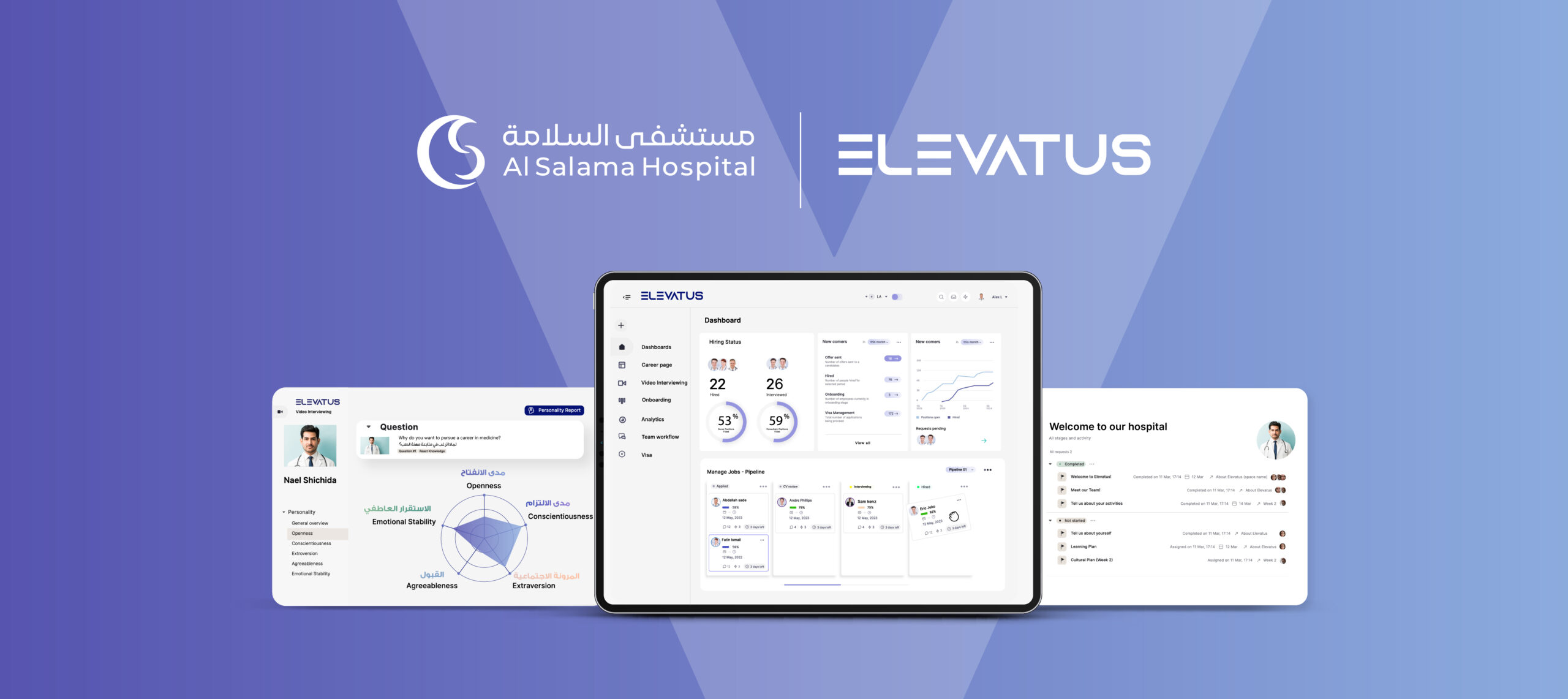
General
Talent Acquisition vs. Recruitment: What Exactly Is the Difference?
May 13, 2022
Reem Al-Tamimi
Content Writer
Hiring. Recruiting. Talent acquisition. Recruitment. Is talent acquisition the same as recruitment? In short: not really. The terms talent acquisition and recruitment get interchanged a lot. In most cases, they’re even used as synonyms. While the goal between the two is similar – hire amazing talent – there’s quite a difference between the two. They’re comparable in terms of short-term and long-term planning.
Put simply, recruitment is more of a quick fix for an immediate need, while talent acquisition is more about looking ahead to see where a need will likely arise. But is that just it? Far from it!
This talent acquisition vs. recruitment guide will seamlessly help you distinguish between talent acquisition and recruitment and learn how they work together to attract, hire, and retain skilled employees!
Let’s dig in.
What is recruitment?
In easy words, recruitment is the process of finding and hiring qualified candidates for Job openings – in the fastest time possible. It usually follows a predefined recruitment process that is highly standardized.
Today, recruitment often takes place when you need to fill an unexpected vacancy because of an employee’s unexpected departure. In essence, if the notice period is short, hiring managers should move through the recruitment process fast.
This type of reactive recruitment can be a major downfall if you’re short on resources, technology, and staff. If you’re recruiting for hard-to-fill roles that need months to fill, it can place a huge burden on your existing team. As a result, this can lead to fewer qualified candidates since it will be challenging to find the right candidates in the right place at the right time.
All in all, recruitment comes in handy for companies who need to fill a lot of positions in a short amount of time. In this case, recruiters should know exactly what these positions entail, collaborate closely with their team, and familiarize themselves with hiring platforms.
What is talent acquisition?


Talent acquisition is more of a long-term strategy to identify and attract top talent that your company wants to hire in the future.
Top talent doesn’t just fall out of trees. So it’s the responsibility of the team to bring them on board through an effective talent acquisition strategy.
Ultimately, it also involves marketing the company’s employer brand, proactively building candidate pipelines, maintaining relationships with past candidates, and strategically sourcing passive candidates.
Today, talent acquisition specialists typically work closely with the marketing department to impeccably align the company’s brand with the employer brand. In the end, both clients and candidates should have a great, lasting first impression of your company.
In addition, these specialists should also work with HR managers and executives to keep track and measure all company objectives and future plans. Talent acquisition specialists need to understand the company’s business goals in order to identify future talent requirements.
This way, talent acquisition teams can scout for top talent in advance and build ideal personas with the management. All in all, you can think of talent acquisition as a team sport. While HR professionals might be taking the lead, if talent acquisition teams aren’t in sync, it can cause major downfalls in the talent acquisition strategy.
What is the difference between recruitment and talent acquisition?
We’ve established earlier that talent acquisition and recruitment have one goal in common: attract and hire qualified candidates for the company. We’ve also established that recruitment focuses on the short term, whereas talent acquisition focuses on the broader scope.
But there are other differences between talent acquisition and recruitment. When it comes to recruitment, the process merely comes to an end as soon as the candidate is hired. On the other hand, talent acquisition is an ongoing process. Even after the hiring process comes to an end, talent acquisition teams are still keeping an eye on the candidate and tracking their progress.
The recruiter’s job typically begins with a vacancy and then bridges into sourcing, screening, and interviewing qualified candidates. A talent acquisition specialist builds talent pipelines ahead of time and works hard to improve the company’s employer brand, recruitment metrics, and quality of hire.


Recruitment is action. Whereas talent acquisition is strategy.
In the HR world, it’s not the talent acquisition specialist vs. the recruiter. Both roles have their own strategies but tend to work in tandem when necessary. When a hard-to-fill vacancy suddenly springs up, the recruiter’s first instinct is to help the talent acquisition specialist.
- They review potential candidates and talent pools together.
- The recruiter makes the first contact.
- Talent acquisition specialists also identify existing employees for upskilling.
Considering how talent acquisition is also involved in employee engagement, talent acquisition specialists also work to identify existing employees who can get potentially upskilled. Then, recruiters will follow up with the management involved and post the vacancies on the career site, job boards, channels, or social media platforms. Afterward, they begin passing good candidates who aren’t qualified for the particular vacancy into the talent pool. At last, the talent acquisition specialist walks in and takes over the process of building a solid connection with these candidates for future vacancies.
Do you see now how they work closely together but are somewhat different? They might have different roles, but both work hard to find great hires that will help the company thrive, grow, and flourish!
Should you focus more on talent acquisition or recruitment?
Evidently, the answer to this question depends on your company. Is your company looking to fill positions fast? Or take its sweet time in building and cultivating a great talent pool?
It’s not impossible to have both, but at a certain point, you might have to prioritize one over the other.
Let’s put this into perspective. Assume that your business is operating in the IT sector and you’re looking to cultivate talent acquisition. Tech startups tend to bloom when taking the long-term approach. Simply because technology today is advancing faster than the speed of light, companies tend to fall back if they don’t have a stellar talent acquisition strategy in place. So, if you’re a startup that’s looking to build solid roots and a strong foundation prior to disrupting the industry, it pays to have fresh talent on hand at all times. Rather than restarting the process all over again as soon as a vacancy comes up.
But bear in mind the following: even if your business is well-established, it’s always a great idea to invest in talent acquisition. This will show prospective candidates that your company is willing to invest in their careers, which will ultimately entice them to join your company and help it thrive and grow.
Now there’s nothing wrong with recruitment, but all too often, when companies solely rely on it, they tend to rush into making quick hires which may lead to a higher turnover rate and lower team morale. Last but not least, talent acquisition is usually the preferred approach for building a certain position from the ground up. Simply because job vacancies have an established framework, whereas new positions can be a mystery to employers themselves. Therefore, you’ll find many employers hiring the best talent and allowing them to tailor their positions according to their own skill sets!


Talent Acquisition vs. Recruitment
If you’ve got short-term goals and you need to move fast to fill a vacant spot left by a former qualified employee, then recruitment is your best option. But if your HR goal is to invest in top talent and groom them in the long run with your company, then talent acquisition is the right approach for you.
Either way, whether you’re looking to cultivate recruitment, talent acquisition, or both – our award-winning hiring platform can help.
EVA-REC is an on-demand hiring platform that automates and improves the recruitment and talent acquisition process through AI technology. It offers businesses of all sizes and shapes AI-powered features that help them create a rich and immersive hiring experience for everyone. Through EVA-REC, companies can drive merit-based, objective, and fair hiring practices that minimize bias, without dehumanizing the hiring process.
Turn top talent to employees fast
Hire, assess, onboard and manage top talent for every job. See how Elevatus streamlines everything; from acquire to new hire.
Request a demoAuthor
Reem Al-Tamimi
Don't miss a thing!
Stay one step ahead. Subscribe and get the latest updates, news, and insights from Elevatus straight to your inbox.







